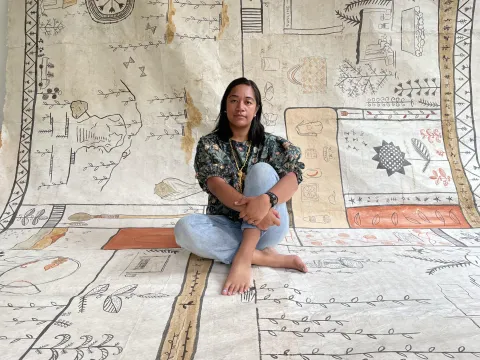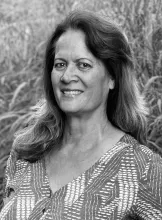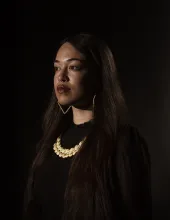
Barkcloth makers Lehuauakea, Dalani Tanahy, and Cora-Allan Lafaiki Twiss will discuss the tradition and practices of Hawai'i and Niue.
Lehuauakea is a Native Hawaiian interdisciplinary artist and kapa maker from Pāpaʻikou, Hawaiʻi. With a particular focus on the labor-intensive making of kapa (barkcloth), ʻohe kāpala (carved bamboo printing tools), and use of natural pigments, Lehua is able to breathe new life into patterns and traditions practiced for generations. Through these traditional Native Hawaiian craft practices, their work addresses themes of environmental relations, Indigenous cultural resilience, and contemporary Kanaka Maoli identity. Lehuauakea has spent the last several years learning from well-known barkcloth maker Wesley Sen of Moanalua, Hawaiʻi, who trained in barkcloth-making with Pua Van Dorpe, Beatrice Krauss, Malia Solomon, Carla Freitas, and Dennis Kanaʻe of Hawaiʻi, and Mary Pritchard of Sāmoa. Through these intergenerational land-based practices, Lehuauakea aims to build on this tradition and ultimately share it with the next generation to ensure that this mode of Indigenous storytelling is carried well into the future.
Lehuauakea’s work has been shown in exhibitions nationally and internationally, and is held in many private and public art collections around the globe. The artist is currently based between the continent and Hawaiʻi after earning their Bachelor of Fine Arts degree in Painting at Pacific Northwest College of Art.
Dalani Tanahy is a native of San Diego, California with maternal roots in Maui, Molokai and Moku O Hawaii and has lived in Makaha, O`ahu since 1986. She has been a practitioner and teacher of the arts of Hawaiian kapa or bark cloth making. Dalani’s work has been one of revival, as the art of kapa was dormant for almost one hundred years. She not only creates kapa and grows the Paper mulberry/Brousonettia Papyrifera trees necessary to create the bark cloth, but also the wood and stone tools and plants used for dyes. Teaching kapa extensively ensures that the art is not lost again, and she is currently an instructor at the University of Hawaii-West O’ahu Campus in the Hawaiian and Pacific Studies Department. As a researcher Dalani has been able to travel and study collections globally and has her work in permanent collections at the British Museum in London, the National Museum of the American Indian in Washington DC and The National Museum of New Zealand-Te Papa O Tongarewa. As a commissioned artist, Dalani has original and graphic work in many hotels, resort, and other properties in Hawaii, including the Aulani Disney Resort and Spa, Ka Makana Ali’i Mall in Kapolei, O’ahu, St. Andrews Priory Chapel/Royal Patrons Chapel in Honolulu, O’ahu and many more. Dalani’s work as a traditional Hawaiian practitioner and cultural ambassador has been recognized by the Polynesian Cultural Center as a recipient of the “Lei of a Living Treasure Award” 2013, a Native Hawaiian Artist Fellow with the Native Arts and Cultures Foundation, 2015 and the Hawaii State Legislature Recognition as “Mana Wahine O Makaha” Hawaiian Kapa and Arts Practitioner, 2019.
Cora-Allan Lafaiki-Twiss is a visual artist and traditional maker. After being encouraged by her Niuean grandparents to make hiapo – the Niuean practice of barkcloth painting – she has mobilised generations of Niueans to connect with and experience a previously dormant artform. Using purist hiapo-making methods with materials such as ata bark, mangrove inks and pandanus seeds, she is placing the artform back into the community highlighting the noticeably botanical forms of Niuean Hiapo.
As an AUT graduate with a Masters in Visual Art and Design and a background as a technician and curator, Cora–Allan’s deeply considered practice has caught the attention of major galleries, museums and collectors. Despite this, her work remains firmly rooted in community, and she fluidly moves between institutional and community spaces. Her confident artistic voice translates to a strong presentation of work, and she is already gaining significant momentum in Aotearoa and abroad. (Source: The Arts Foundation Te Tumu Toi, New Zealand)
Bark Rhythms: Contemporary Innovations and Ancestral Traditions and associated programming is co-sponsored with the North American Hand Papermakers.



